Sinead and John Kerr: "We'll always be involved in this sport"
 March 24, 2012
By Anna Zeitlin, Reut Golinsky
Photo © Marni Gallagher, Eva Maria Jangbro (EMJO), Anna Zeitlin, Reut Golinsky
One of the most loved couples in ice dance, Scottish Sinead and John Kerr, officially retired from skating last summer. Unfortunately they were not able to compete at Worlds due to Sinead's injury, but they finished their competitive career on a high note with a bronze medal at the European Championships in Bern.
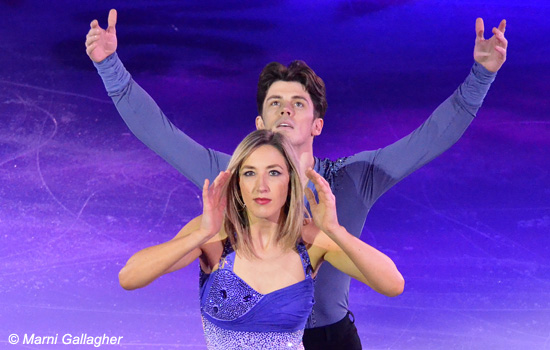
In this interview they recall their last competitive season, give us update about what they've done recently, their plans for the future and talk about the upcoming Worlds.
Sinead, your injury was the reason you both missed Worlds 2011, and retired earlier than you planned. How is your shoulder now?
Sinead: It's much better actually, thanks. I had surgery last April, and by summer it was well enough to do Mao's show in Japan ("The Ice" - ed). I would say I'm pretty much rehabilitated, 75-80 % in the summer and it just got better from there. By now it feels almost back to normal. I don't think I will ever have the full comfortable movement I had before, but that's a good thing, because before I had so much movement it was a problem. So it's absolutely fine to skate with it now.
You finished your career with a European bronze in Bern. It was your second medal at Europeans. Did the second medal feel different? Less exciting maybe...
Sinead: I think it was quite good. In a way we were disappointed with not getting the medal a year before that (in season 2009/10 when they finished fifth - ed), so this time felt just as nice as the first time really.
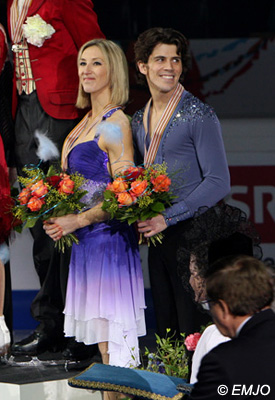 John: Also because we didn't compete much during last season, it was nice to come back and get the medal. We missed some events because of Sinead's injury, so it made us feel very proud that we were able to still train and people were finally able to enjoy a good performance from us. The first medal is probably more special because it's the first one. But the second one is special as well.
John: Also because we didn't compete much during last season, it was nice to come back and get the medal. We missed some events because of Sinead's injury, so it made us feel very proud that we were able to still train and people were finally able to enjoy a good performance from us. The first medal is probably more special because it's the first one. But the second one is special as well.
When you performed in Bern there was some kind of freedom in your skating, it felt as if you didn't care about points and places. But in the Grand Prix you were really-really...
John: ... tense...
Sinead: Probably because of the injury. And because we knew it was our last competitive season. And because we had a really great program we loved doing. All those things in our heads in practice leading up to Europeans allowed us to think: you know, we've got a great program, we're enjoying skating, we are injury free now... It's our last year; we can do this, let's just go and try and be relaxed and enjoy it!
John: That's what we always said when we decided to do that season. After the Olympics we were not sure if we wanted to do another competitive year, because we hadn't really enjoyed it as much as we would have liked. And this was all about trying to get back to what you remember loving about skating when you were a kid and it was just fun. And that was the idea behind the free dance - getting back to basics.
You attended the last European Championships as spectators only. How was it to have the competition on home turf?
Sinead: It was fantastic. It was surreal for us because it was odd being at home and it was odd not being in it.
You were probably asked a zillion times if you regretted not competing there.
John: I can understand why people would ask that. The thing is that people don't always understand the 11 months of training you have to put in, in order to compete. And then you just look at the way your life is. At that stage, with Sinead and her shoulder, you've got to make decisions - is it worth it? You know, if I didn't have to train and I could still have that moment, then great! But if I have to do 11 months of training and do all that work, maybe you want to do it less...
Sinead: People ask if we miss it. Of course we do, because obviously you miss something you enjoyed. But we wanted to come out of it while we still enjoyed and loved it. And we didn't want to continue until we were sick of it and people were sick of watching us. So we were quite happy to take a step back and let other people take some of the limelight for a change.
John: It was a great moment for Nikki and Penny (Coomes/Buckland). It was their big chance to step out of our shadow, and they did a great job, I was really happy for them. I guess we've kind of been mentors for them for the last two years, so it's nice to see them develop in that way. I felt very proud of them.
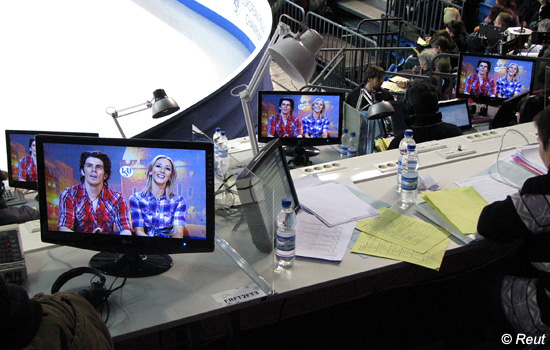
And still we missed you a lot this season...
Sinead: I like the idea of retiring when people still want to see you.
John: For example, I'm sure that a lot of people still want to see Stéphane Lambiel in competition. But the funny thing is that for me it's far better to watch Stéphane in a show, because there you really see the great Stéphane Lambiel who is so free and so amazing to watch. And sometimes in competition I felt he almost seemed too restricted in what he could do. So I much preferred to see him in the exhibition.
And you felt the same about yourselves? Ice dance is a bit different than single skating, it is still a show.
John: It is, but then there are all the elements. And a lot of new teams, like young Russians, come up who are great. And in a competitive sense it's difficult to always stay in front. You don't want to get your stage when you're getting beaten by kids; you don't want that to happen to you. So sometimes it's maybe better to leave the stage...
Sinead: ...when you're at the top.
The short dance was introduced when you were still competing. This season you could also watch it as spectators. So from both points of view, what do you think about this innovation?
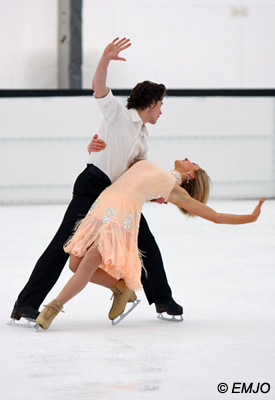 Sinead: I possibly preferred the old way, but I understand why they changed it. I like the idea of having just two programs, like all the other disciplines. But from an interest point of view... I used to like watching the original dances. For example, I found the country-style good.
Sinead: I possibly preferred the old way, but I understand why they changed it. I like the idea of having just two programs, like all the other disciplines. But from an interest point of view... I used to like watching the original dances. For example, I found the country-style good.
John: The problem with the system they have now is that you couldn't have, for example, Meryl's and Charlie's Indian program (the original dance Davis/White skated during season 2009/10 - ed). Can you imagine having a compulsory dance in the middle of that program? Or Tessa and Scott with their Flamenco (the original dance Virtue/ Moir skated during season 2009/10 - ed).
Sinead: I'm not sure the short dance can get standing ovations anymore, because the compulsories are stuck in there.
In your short dance last season, you very deliberately did it in two parts.
John: It was a very deliberate juxtaposition. Back then you had time, two and à half minutes, to create a mood. Now the problem is that the compulsory part, no matter how good you are, breaks that mood.
Sinead: Maybe it will get better, maybe people will get used to it and it'll be fine. I can understand the good side of it, but personally I prefer the old way.
John: I think the old way is better. I think they should just do the original dance and maybe do the compulsory in the qualifying round.
And when you were competing was it easier for you to prepare two separate dances - compulsory and original - instead of mixing the two together?
John: No, it's easier now. Sometimes we would have four-five hours at night, so we would do one session completely on two compulsory dances, and then on the second night we would do the free dance.
Sinead: Whereas now we could do the short dance in the morning, the free dance in the afternoon and that's it. So from a training point of view it was nice and it was easy. I'm just not sure about the audience point of view...
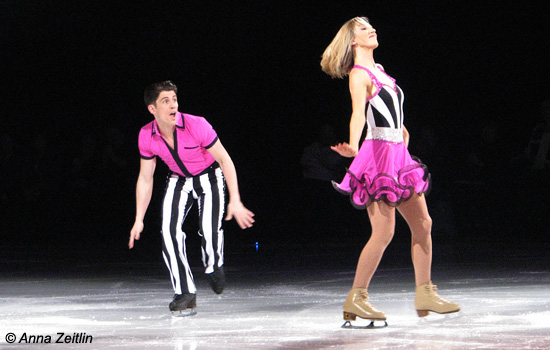
John, at Europeans we also saw you in the kiss and cry with the Israeli and the Ukrainian dancers.
John: Yes, I've been working a little with Galit Chait in Hackensack, because it is close to where I live and she asked me to come and help with the team. And we were at Europeans as ambassadors for the event anyway, so Galit asked: "Since you've been working with us, do you want to come and sit (in the K&C)?". It was a strange experience for me being on that side of the boards, because I competed in that event last year. Trying to say something to someone, when I could remember what I was going through at that stage... It was very fresh for me. It was a nice, new experience.
Did you like it? Do you want to do it again?
John: I probably liked it more than if I actually had to go and compete. But it was fun. It's one of those things I fell into, just because I live pretty close to Hackensack and Galit asked me to come.
Sinead: And we don't have the shows every day, they are sporadic. Even "Stars on Ice" is only on weekends, so we have free time. You know, you can't just do nothing...
John: It's nice to help those guys. And I'm not the main coach, so it's easy to come and go and do the shows.
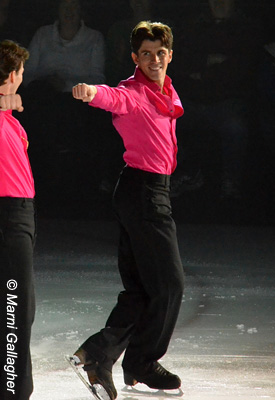 Were you working only with the dancers?
Were you working only with the dancers?
John: Mainly. I've done a little bit of choreography. I actually did Kyoko's and John's (Ina/Zimmerman) program "Johnny Got a Boom Boom". It was a great experience for me to work with a great pair and it was a lot of fun. I'm kind of doing bits and pieces.
Will you work some more with Galit, or maybe with other coaches?
John: At the moment it's fun and I'm enjoying it. I'm not thinking too far ahead in the future. It's nice to be able to do shows, which is the main thing I like to do, but it's nice to coach a little bit as well. (As of yesterday John has agreed to be a more regular part of Galit Chait's coaching team - ed)
For us fans, it's really nice to see our favorite skaters continue in this sport.
Sinead: The thing is we've dedicated so much of our lives to this sport, it's unrealistic to say I would want to get out of it and become a banker or lawyer or a doctor. We've been involved for so long, I think we'll always be involved in this sport. And the main way to be involved, in case you don't want to be a judge, is to be a coach and that's what I guess we'll both eventually want to do. Coach, choreographer, something like that.
John: Igor Shpilband recently said to me: "Skate for as long as you can". He is someone who coached from a relatively young age, and it's great to have success as a coach as he has. But when you're the one performing...
Sinead: ...it's so much more satisfying. As long as we stay healthy and energetic. We still have more to give; we both feel that artistically we can open up ourselves a bit more, there is still so much more we can develop in what we do.
John: You can always get into the coaching game, but you get the biggest buzz while performing for an audience.
While you still competed, you also choreographed some of your programs, right? For example, some of your exhibition programs?
John: Most of the time, yeah, it's something we always enjoyed doing. It's a lot of fun to put something together, and because of the limited time it's easier 'cause we know each other so well, we know what moves we do the best.
During Euros 2010 in Tallinn you were inventing your gala program...
Sinead: ...the day before!
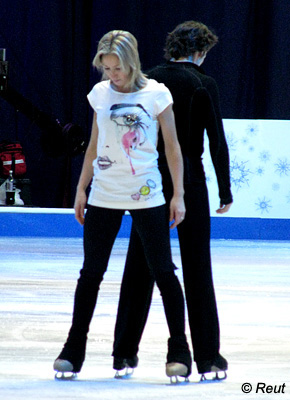
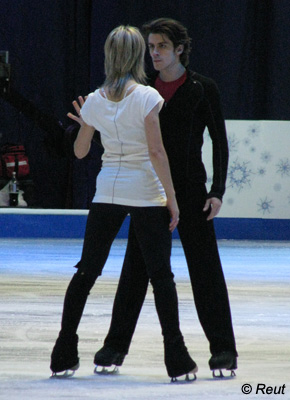
The music choice - "Exogenesis: Symphony Part 3" by "Muse" - was so good that you decided to use it for a competitive program?
Sinead: We figured if we could make up a routine in one day and people loved it, then the music must be helping. So it would be OK for a free dance...
Maybe it wasn't only because of the music that people loved it...
(both laugh)
Sinead: Well, the music helps.
John: What was really cool about doing that exhibition in Tallinn, was that somehow it appeared on a bunch of "Muse" fan sites. People who normally wouldn't watch figure skating noticed it, because if you googled "Muse", one of the first videos which came up was probably us. So it was cool that people who wouldn't necessarily be interested in skating saw and liked it. I don't want to do it so often, but "Muse" have a bunch of other songs that may work really well. I don't know why that is... Maybe because Matthew Bellamy (lead vocalist and main songwriter of "Muse" - ed) comes from a classically trained background; he borrows from a lot of classical music. Sometimes you hear a tune and you know that he has maybe changed it a bit so that it becomes theirs. That actually matches skating pretty well.
Sinead: That's funny. Gwendal Peizerat said to us at Europeans a year ago: "I'm so jealous of you, I've been listening to the new "Muse" album and thinking it would be amazing to skate to it, that one day someone would skate to it and you skated it!"
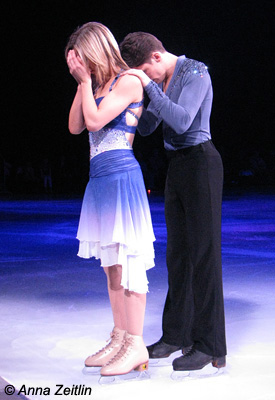 Were you also involved in the choreography of your competitive programs?
Were you also involved in the choreography of your competitive programs?
John: Absolutely. Last season we pretty much did the short dance yourselves, with Evgeny Platov's input as well. That's how we always worked on things. But the free dance we gave to Peter Tchernyshev. In a way it was nice to take the pressure off yourself to always come up with something, and to work with somebody who is so brilliant and put the pressure on him for a change. We made some adjustments, but it's pretty much his work.
Sinead: It was his vision.
Looking back a few years it seems like you were crazier than during your last competitive years, in costumes, in programs...
Sinead: Of course we wanted to entertain and to please the audience and please ourselves, but you get to the stage where you start thinking: we have to show that our skating is improving to get higher placements. We were competitive and wanted to medal. And the only way to get a medal was to show how our skating skills had improved, not to hide behind...
John: ...choreography or ideas. When we did "Enigma" (the free dance they performed during season 2007/08 - ed) or some routines like that, maybe our skating wasn't of the quality needed to medal. But we had good ideas. Whereas when our skating got better, from the time we were working with Evgeny Platov, we were able to show a more mature, refined style. After Worlds 2008 in Gothenburg, we trained a lot on the first "Muse" program. Skate America was our Grand Prix event, and I remember that a couple of judges came to us saying: "Oh, my gosh, you skating has improved so much!" So they recognized that almost straight away.
Sinead: On the level of medal potential.
John: So instead of places four, five, six, it was three, two, one! You're put in a different category.
Yet even with your more refined style you never skated to classical music. Why?
John: In pairs, ladies and men they use a lot more classical music. So in a way I think the job of ice dance is to be a little more different and creative in the choice of music. I know in single skating and in pairs, it's a little more restrictive because they have so many elements to think about.
Sinead: And they can't use vocals. I think the thing is that we want to skate to music we like to listen to. And I wouldn't normally sit and listen to classical music. But if there was a piece I really liked, then yeah, I would skate to it.
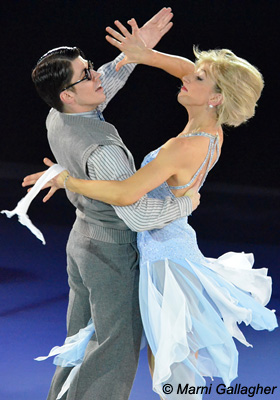 Going back to the topic of choreographing for others; if you could choose any competitive skater to work with, who would it be?
Going back to the topic of choreographing for others; if you could choose any competitive skater to work with, who would it be?
John: Wow, that's a question... (both take their time to think) Well, dance is the hardest thing to choreograph. Pair's free skating is really easy, because they have the baked elements, so you don't have to choreograph a lot; it's really only a few moments. Right now the men is the most interesting event, because you get the variety. In ladies there is this style they all have to do and they just do it better or worse. (to Sinead) I'm trying to think if there is anyone of the girls you would like to do something different with...
Sinead: Mao (Asada), maybe. I don't actually remember her programs this season, but last season and the season before I felt like her programs didn't quite fit her character. I've seen her doing show numbers where she is more fun and bouncy, and I feel I would quite like to put something together for her. Because I feel she hasn't found something that really suits her character. Everything is a little too heavy and I'd like her to do something lighter.
I'd also like to choreograph a program for someone who is really great, so you wouldn't have to do much. For someone like Daisuke (Takahashi) you could step back and let him do it all, and you will still get credit as his choreographer! (laughs)
John: I would love to do something for Artur Gachinski. Because his programs are... I almost want to go and tell him: "OK, let's think of something because your programs are not good. And I don't care if you were second or whatever at Europeans".
Plushenko didn't have great programs either, not choreography-wise...
John: But Plushenko brings the history of figure skating with him, this amazing career! We sat there and we know he's not the best for the new judging system, but you get taken by it. At Europeans he got standing ovations, and these people don't know figure skating! He has presence, he has charisma...
Sinead: ...he has attitude. Something that is not definable with points, but still you watch it and you want to give high marks because of that.
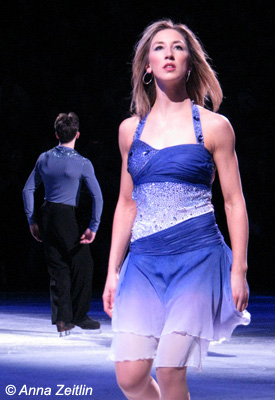 John: Gachinski doesn't have that presence, or that history of figure skating behind him. Evgeny can do that because he is Evgeny, whereas Artur is not...
John: Gachinski doesn't have that presence, or that history of figure skating behind him. Evgeny can do that because he is Evgeny, whereas Artur is not...
So you would like to do a makeover for him?
John: I'd love to do a makeover for him, because I think he needs it. He's super-talented and I do think he can definitely do something a lot better.
Sinead: He can makeover Artur, and I'll makeover Mao. (laughs)
Back to you and what you're doing now. This season you're skating in "Stars on Ice" for the first time...
John: Yeah, it's very exciting. It's such a dream to be able to skate with people like Kurt Browning, Todd Eldredge and Ilia Kulik. And we're good friends with Ryan Bradley, so we are having a good time hanging out together.
Sinead: It's a very nice cast. We had a very intense schedule while we did our rehearsals in Lake Placid back in December, so we all got very close as a team and it feels like we're one big family.
How was it to work with Kurt Browning and Jeffrey Buttle as choreographers?
John: It was brilliant. They're such a good combination, because Kurt is great on the steps, and Jeff's really good with the timing and the upper body movement and everything.
Sinead: I think we had the best of both worlds with those two, the main driving force of what we did on the ice; it was great, all the team was fantastic.
John: It was also Geoffrey Tyler, a good friend of Kurt's, who made a lot of really good suggestions. So we had a great creative team. And the other Jef, Jef Billings (director/designer of "Stars on Ice" - ed). When I was growing up as a single skater Kurt was my hero, so it's just surreal to be able to be in a show with him. The guy is 40 years old and he still does some amazing stuff. I hope I can do that when I'm his age.
Unfortunately you're not doing any European shows this year...
John: No. We could've done Daniel Weiss' winter tour, but it clashed with doing the first SOI show in Lake Placid. But we did Daniel Weiss' and Elvis Stojko's show in Canada, 'cause we had one show up in Peterborough, so it's always great to get to work with those guys again.
Sinead: We would've loved to do the "Art On Ice" show again, obviously, but we've done it for the last couple of years, so they needed a fresh cast. We didn't get asked this year.
John: To be honest, I totally understand that. "Art On Ice" was always based on changing cast and singers. The only people to always skate there are Stéphane Lambiel, Sarah Meier, Aljona and Robin (Savchenko/Szolkovy). I think it's good for the show to alternate the cast. So it's fine, as long as we get to do this again...
Sinead: ... at some point.
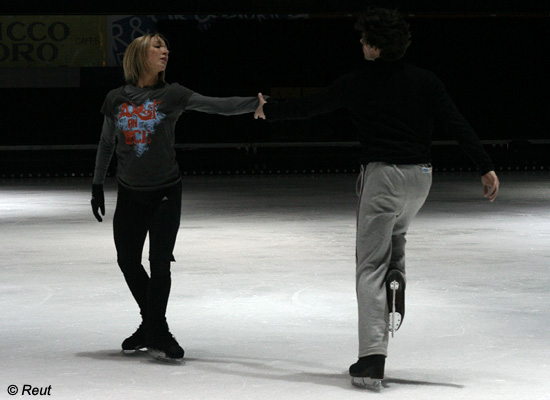
Worlds is next week. What would be your predictions?
Sinead: It will be really tight. This year somehow I have a very slight preference to Meryl and Charlie, but it's a balance. I love Tessa and Scott; they're amazing skaters, that's not even a question. But there's something about Meryl and Charlie, their energy and their programs this year; it just takes me.
John: They're possibly having Tessa and Scott, Meryl and Charlie too far ahead at the moment. I think sometimes when I'm watching and they are 10-15 points ahead - it's not 15 points difference. It isn't! Especially in free dance, Nath and Fab (Nathalie Pechalat/Fabian Bourzat) are right up there with them.
Sinead: They're not that far behind in the free dance. Also there's Kaitlyn and Andrew (Weaver/Poje).
What about the men? Do you think Patrick Chan will take the gold again?
John: He can fall at least once and still win. He's probably the most consistent, because even Daisuke is not consistent on the quad. Even at Nationals, Daisuke won just the short. In the long he was only third; he's never performed two good programs back to back.
Sinead: I think if Daisuke put on two great performances, he would be my preference, but I don't know if he can... Like John says, it seems that Patrick can afford to make mistakes.
John: He has a "one fall cushion"; he can fall and somebody else skate clean, but he can still win. Sometimes his components are a little crazy, but... His quads are great and when he is on his A-game, he is probably the best in the world. I think what people object to is when it seems like you're missing quite a bit, but still winning by 10 points. I think that's confusing for an audience.
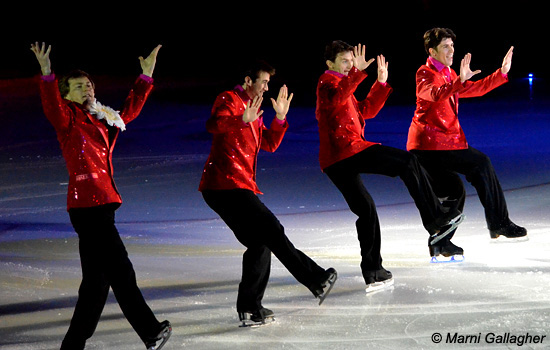
And Jeremy Abbott has really great programs this season.
Sinead: Yeah, I love his short program, it's amazing! And his long program is our music, so we love that. (laughs)
John: His short is phenomenal. He hits it out the park, it's amazing! You know, he worked with Benji Schwimmer on it, and Benji is great, he won the series "So You Think You Can Dance". Is Yu-Na Kim doing Worlds? She's not doing it this year... Then it could be anyone. We could get someone like... Ashley Wagner winning, she looks really good this year.
Sinead: The men's competition is probably the hardest at the moment. I'm glad I'm not a single guy skater.
This talk reminds us that you, John, wrote some really interesting comments during last Worlds, both on Absolute Skating and on your Facebook wall.
John: I think because I wasn't doing the event, I was just bored and trying to do something; I wanted to feel involved somehow. I was probably a little personal with some of the stuff, but I think sometimes it's good to get an honest appraisal of what you think of it.
Is it hard to comment on somebody you've competed with?
John: Yeah, it is, and in dance you're possibly a little more guarded about what you say...
Sinead:... because you know you will see them at a show two weeks later! (laughs) Kurt Browning does commentary for Canadian TV, and he said he finds it hard because he'll be honest about a skater and then realize he'll see them a week later, and they might ask: why did you say that about me? So I think you always have to watch out.
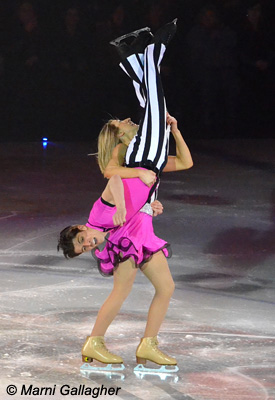 In general you are both pretty active on Facebook, and communicate a lot with your fans there.
In general you are both pretty active on Facebook, and communicate a lot with your fans there.
John: Facebook is a good way to let people know. Sometimes when you're not competing it's very easy to get forgotten, so it's like a little reminder.
Sinead: It would encourage people to come to the shows instead of competitions.
But you don't update your website as often. Pity; we really liked your diary.
Sinead: That is a mistake of ours. It's just quicker and easier do update on Facebook and Twitter.
John: To think and write an article is harder, but I should make myself do it. Sinead actually writes a fair bit for the only British skating magazine ("iSKATE"), so I should probably write a little bit more for the website. We just renewed it for the next year or so, so we should probably do something with it. When you pay for it, you might as well do something.
Do you feel you get less feedback and attention from fans than before?
John: Possibly more, 'cause I think I have more time to write updates...
Sinead: And correspond with the fans.
John: Personally I do a little more of replying to messages from fans. We got a lot of very nice messages, but sometimes when you're competing you're just so focused... You appreciate it; you just don't get around to writing back.
Sinead: Your mind is a little blank because you think so much about what you're doing, but now we're a bit more open-minded...
John: We're in much less stressful situations now, so we're able to communicate more.
You were always loved by skating fans. During Europeans in Bern, commentators noticed that the crowd cheered more only for Swiss skaters: for you and then for the Swiss skaters.
Sinead: For some reason we seemed to be able to be everyone's second favorites: like you have Russian supporters, French supporters, German supporters; they cheered for their own skaters and for us. So we were everyone's second favorites...
John: It's like in soccer; Brazil is everyone's second team. Even if you're English and support England, you'll also support Brazil.
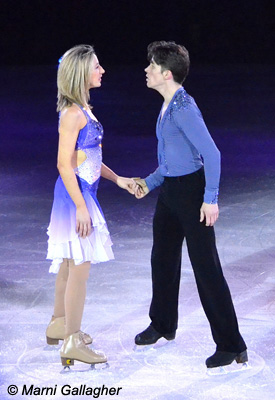 What do you think your secret is?
What do you think your secret is?
John: I think the biggest thing is that we are... real. It's the realness! And it's something you feel when you watch somebody skate. I think Stéphane Lambiel is a great example; you know he is not faking it, you know it's what he is feeling. And when someone is that open, the audience loves it and that's a wonderful thing. People who maybe don't understand skating or dance so much can still feel it.
Sinead: When we skated the free dance we felt happy and relaxed, and you could see that on our faces. We were smiling because that's what we felt. And people sense that the relationship we have with each other and with the audience is real. We won't fake an expression, and that comes across to the audience.
John: Most of the time when we're off ice, we are very friendly and very open when fans want to talk, because you have to make time for the people who come to watch.
Sinead: You wouldn't have the competition without the fans...
John: There are three things we need: the judges, the skaters, because without them there is no competition, and an audience since when there is no audience to watch there is no competition either. You need all those things and that's why everyone has to respect each other.



